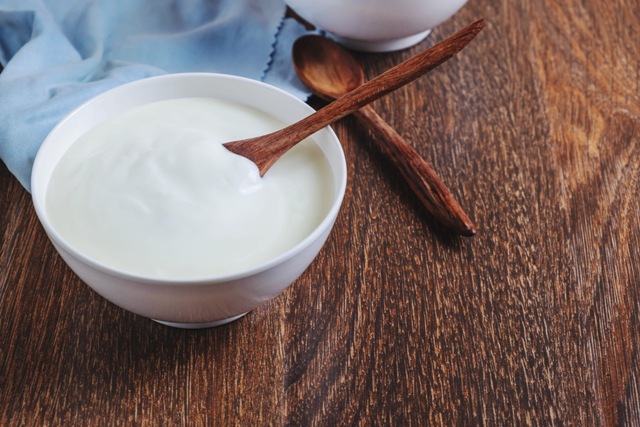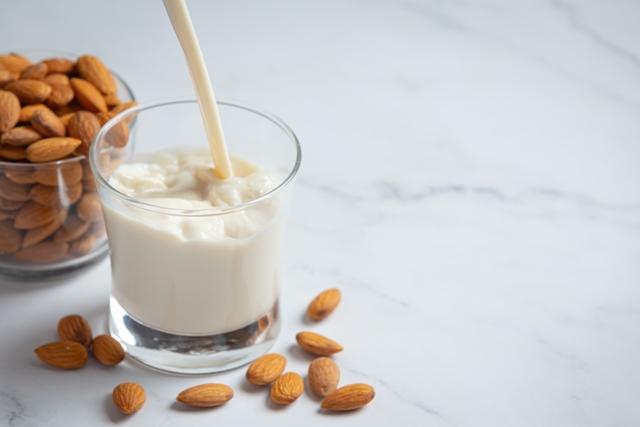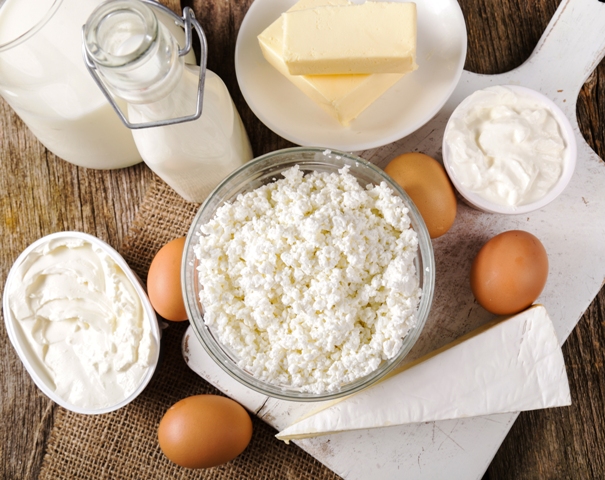Yogurt is a nutritious dairy product prepared by microbial fermentation. It is a protein and calcium rich food also contains significant number of micronutrients and offers numerous health benefits.
Nutritional overview
- It contains desirable amount of carbohydrates
- It contains significant amount of protein and casein is considered as the main protein of yogurt
- It contains less amount of fat and the fat content of yogurt is entirely depended upon the type of milk used for its preparation
- It contains numerous micronutrients and significantly rich in Vitamin A, Vitamin B1, B2, B3, B6, B9, B12, calcium, phosphorus, magnesium, sodium, zinc and potassium
- It also contains living microorganism, which include lactic acid and bifidobacteria that are responsible for improving immunity as well as gut health
Type
Different types of yogurt are found with different characteristics. Below table will show an overview of its type and features –
Types | Features |
| Low fat yogurt |
|
| No fat yogurt |
|
| Greek yogurt |
|
| Kefir |
|
| Frozen yogurt |
|
| Skyr |
|
Preparation of yogurt
It is very easy to prepare yogurt at home. Below mentioned four steps should be followed for preparing it –
- At first the milk (whole milk or skimmed milk) should be heated
- Then it should be cooled down
- After that yogurt should be added to the milk followed by stirring
- Then it should be kept untouched for 6 to 8 hours afterward it can be consumed

Biological activity
Antioxidant activity
- It contains various bioactive components, which have produced during fermentation process, exert strong antioxidant activities that help to reduce the concentration of free radicals within body and protect the body from their harmful effects
- It also improves cellular functions by reducing oxidative stress hence reduces the risk of developing degenerative diseases
Anti-inflammatory activity
- It helps to reduce the susceptibility of inflammation by enhancing the integrity of the lining of gastrointestinal tract
- It helps to decrease the level of inflammatory mediators in body, which also helps to reduce inflammation
- It helps to reduce swelling and pain as well
Anti-carcinogenic activity
- Conjugated linoleic acid of yogurt produced by bacteria exerts potent anti-carcinogenic activities
- It helps to suppress the growth of malignant cells by inducing apoptosis and also prevents their metastasis
Antimicrobial activity

- Bacteriocins and lactic acid components of yogurt, which have produced during fermentation, show potent antimicrobial activities
- It helps to prevent the growth of microbes within host hence reduces the susceptibility of developing infectious diseases
Health benefits
Role on immunity
- Its probiotic, protein, Vitamin A and zinc components are responsible for boosting up the overall immunity of the body
- It helps to decrease the susceptibility of developing diseases by enhancing the resistant power of the body
- It helps to improve the functionality of T-cell
- Yogurt also plays significant role in treating normal cold and cough
Role on digestive health
- Consumption of yogurt is associated with increasing the load of microbiota in gut (as it contains probiotic or living beneficial microorganism), which helps to improve gut health
- It helps to kill harmful bacteria present in gut and makes the gastrointestinal tract healthier. It especially helps to reduce the risk of developing peptic ulcer by preventing the growth of Helicobacter pylori bacteria
- It also helps to enhance the absorption of vitamins and minerals from intestinal epithelial cells
- It helps to protect the digestive tract from inflammatory damages hence reduces the risk of developing inflammatory bowel disease and ulcerative colitis
- Consumption of yogurt is very effective for reducing the prevalence of diarrhea, bloating and constipation

Role on skeletal system
- Consumption of yogurt is awfully helpful for improving skeletal health as it provides significant amount of calcium
- It is also associated with increasing bone mineral density hence increases bone mass
- It helps to reduce the risk of bone fractures and reduces the prevalence of osteoporosis
Role on mental health
- Individuals suffer from depression should consume yogurt as its probiotic contents are closely related with reducing depression
- It is also very effective for reducing stress and anxiety
Role on oral health
- Consumption of yogurt is extremely helpful for promoting oral health
- Lactic acid content of yogurt is responsible for protecting the teeth as well as the gum from damages
- It also prevents microbial infestation within oral cavity hence reduces the risk of developing oral infections
Role on muscle
- It is a protein rich food stuff and contains all essential amino acids, hence its consumption is incredibly effective for promoting muscle growth as its protein contents act as building block for muscle
- It also helps to increase muscle mass and muscle strength
Role on weight management

- It is associated with enhancing catabolic rate of the body hence helps to burn fat more rapidly that results in weight reduction
- Its protein content is also responsible for providing a feeling of satiety that helps the body to stay fuller for a long period of time. Hence its consumption is associated with reducing food intake, which is accountable for developing a negative energy balance within body that ultimately facilitates weight reduction
Therapeutic applications
- Probiotic components of yogurt significantly reduce the prevalence of body’s reaction to allergens as well as to pollens hence its consumption is very effective for reducing allergy symptoms
- Consumption of yogurt is a healthy option especially for athletes as it helps to replace the energy, which has lost during exercise and its sodium and potassium contents also help to restore the electrolytes lost through sweating
- It also acts as an imperative energy booster as its carbohydrate and B vitamins help in energy (ATP) production
- It plays significant role in reducing the susceptibility of yeast infection
- It also helps to reduce blood sugar concentration hence consumption of unsweetened yogurt is a great option for diabetic patient
- Individuals suffer from lactose intolerance can consume yogurt as yogurt contains comparatively less lactose hence yogurt can be more tolerable than milk
- Consumption of yogurt is very helpful for reducing the prevalence of cardiovascular diseases as it has cardio protective properties
- It also helps to reduce hypertension

General consideration of using yogurt
- It is better to consume yogurt without adding sugar
- Consumption of homemade yogurt is healthier than consuming commercial yogurt as commercial yogurt contains sugars and preservatives, which are not good for health
- It is better to avoid the use of yogurt powder as it is heat treated and the heat may destroy some of beneficial microbes from it

Source:
Chandan, R.C., Gandhi, A. and Shah, N.P., 2017. Yogurt: Historical background, health benefits, and global trade. In Yogurt in health and disease prevention (pp. 3-29). Academic Press.
Donovan, S.M. and Hutkins, R., 2018. Introduction to the fifth global summit on the health effects of yogurt. Nutrition reviews, 76(Supplement_1), pp.1-3.
Fernandez, M.A., Panahi, S., Daniel, N., Tremblay, A. and Marette, A., 2017. Yogurt and cardiometabolic diseases: a critical review of potential mechanisms. Advances in Nutrition, 8(6), pp.812-829.
Freitas, M., 2017. The benefits of yogurt, cultures, and fermentation. In The microbiota in gastrointestinal pathophysiology (pp. 209-223). Academic Press.
Kok, C.R. and Hutkins, R., 2018. Yogurt and other fermented foods as sources of health-promoting bacteria. Nutrition reviews, 76(Supplement_1), pp.4-15.
Panahi, S. and Tremblay, A., 2016. The potential role of yogurt in weight management and prevention of type 2 diabetes. Journal of the American College of Nutrition, 35(8), pp.717-731.
Panahi, S., Fernandez, M.A., Marette, A. and Tremblay, A., 2017. Yogurt, diet quality and lifestyle factors. European journal of clinical nutrition, 71(5), p.573.
Tovar, A.R. and Herrera, G., 2017. Introduction to the yogurt in nutrition initiative at the first symposium of yogurt in mexico: The balanced diet initiative. Advances in Nutrition, 8(1), pp.144S-145S.







